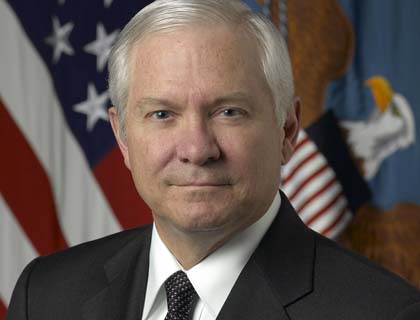KABUL - U.S. Defense Secretary Robert Gates arrived on his final trip to Afghanistan as Pentagon chief on Saturday, acknowledging Americans have grown tired of war but warning that success was imperative because failure would be the most costly result.
Gates, who steps down as U.S. defense secretary at the end of June, said in remarks en route to Afghanistan that continued military pressure on the Taliban could improve prospects for political reconciliation talks, but he also appeared to leave open the possibility of a shift in the U.S. mission.
"You can't be oblivious to the growing war weariness at home and the diminishing support in the Congress," he said. "So I think these are all things that the president will have to weigh and those of us advising him will have to weigh."
But he said in his view it was important to achieve the war aims laid down by President Barack Obama, despite the high cost and flagging support.
"I think that once you've committed, that success of the mission should override everything else because the most costly thing of all would be to fail," he said.
"Now that does not preclude adjustments in the mission or in the strategy, but ultimately the objective has to be success in the mission that has been set forth by the president."
Gates' visit comes as military leaders are finalizing recommendations to Obama about how to implement his pledge to begin withdrawing U.S. forces from Afghanistan in July. Obama made the promise when he deployed additional forces last year in a bid to stop a resurgent Taliban.
Gates, who said his 12th and final visit was primarily a chance to bid farewell to service members, declined to be drawn on the pace of troop withdrawals, saying he didn't want to "pre-empt the president's decision space".
"He's made a commitment that we will begin this process next month, but obviously as we look ahead we're going to have to think ... in terms of where we are," he said. "The president has been very explicit that specific decisions will be based upon conditions on the ground."
Gates said the trip would help inform his discussions about the drawdown because "it is always helpful to go into these discussions with the latest information from the field and some feeling from the ground troops in terms of how things are going".
In remarks to the Shangri-La Security Dialogue in Singapore before leaving for Afghanistan on Saturday, Gates said the generally accepted view was that the war in Afghanistan would ultimately have to end with a political settlement.
"In my view the prospects for a settlement do not become real until the Taliban and the others ... that are the Afghans' adversaries begin to conclude that they cannot win militarily," Gates said.
He said if U.S.-led NATO forces in Afghanistan could sustain their recent successes against the Taliban and expand security within the country, "perhaps this winter the possibility of some kind of political talks on reconciliation might be substantive enough to be able to offer some hope of progress".
The Taliban would have to sever ties with al Qaeda, agree to abide by the Afghan constitution and lay down their arms, he said, but could ultimately have a political role.
"The Taliban are probably part of the political fabric of Afghanistan at this point and can, I think, have -- if they abide by all of the rules I've just described -- have a political role in the future," Gates said.
"My own view is that the political opportunities will flow from military pressure," he added, "and only as long as the military pressure is kept on and there are further gains will the prospects for a political solution be improved." (Reuters)

